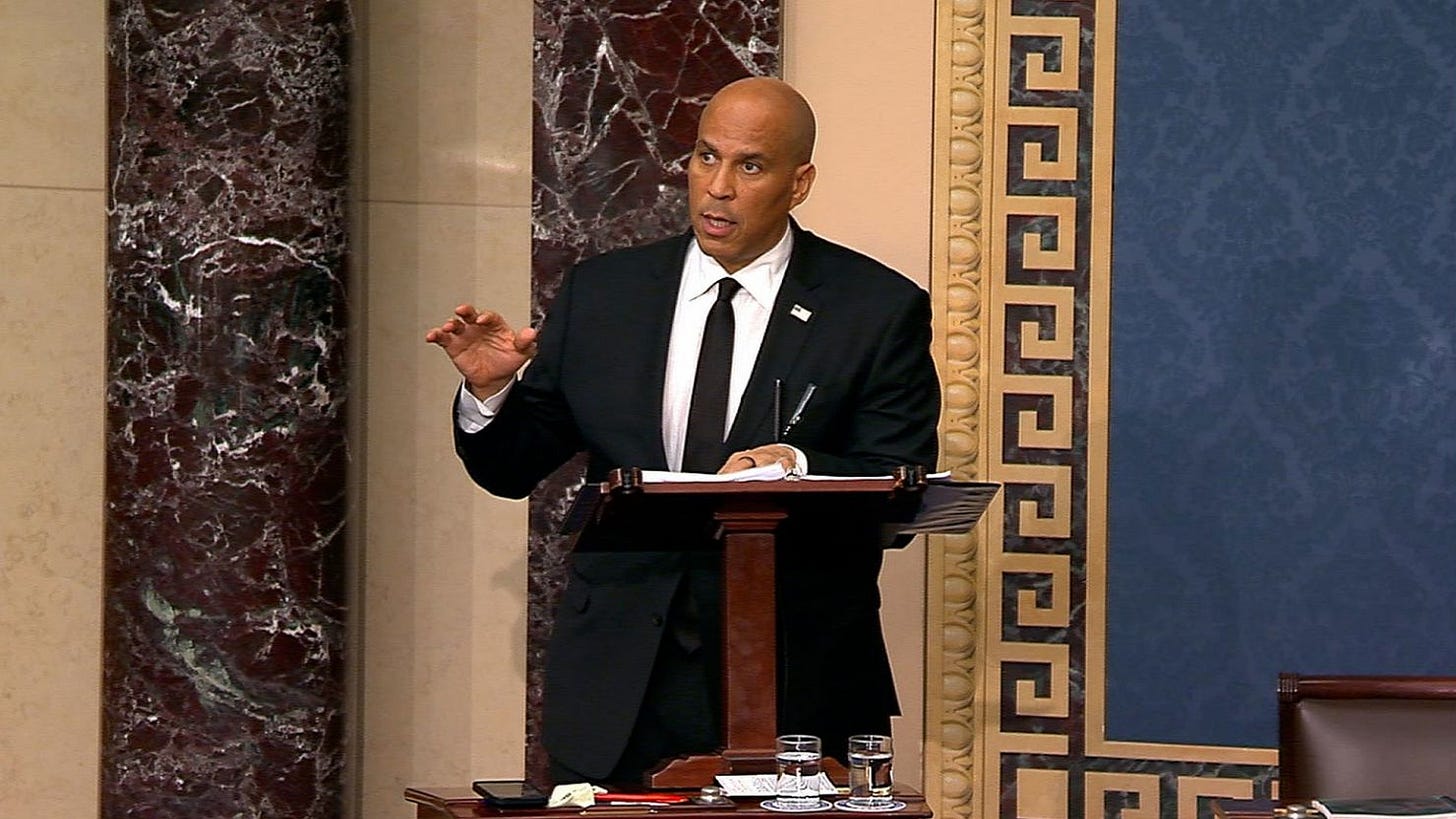Editor’s note: As of publication, Senator Cory Booker is still speaking. This article reflects live events as they unfold.
HE STOOD AND SPOKE, BECAUSE NO ONE ELSE WOULD.
It began at 7:00 p.m. on a quiet Monday. No pomp. No camera swarm. Just one senator in blue, standing on the Senate floor, declaring his refusal to be complicit in America’s slow suffocation under the Trump regime.
“I rise with the intention of disrupting the normal business of the United States Senate for as long as I am physically able.”
—Sen. Cory Booker, March 31, 2025 (Congressional Record, Vol. 171, No. 57)
As of this writing, he has been standing for more than eighteen hours. No bathroom break. No filibuster loophole. No grandstanding for a bill that might win votes back home. Just a man, on his feet, dragging the corpse of moral clarity back into the chamber where it once lived.
WHAT DID BOOKER SAY?
Everything. He quoted John Lewis. He cited John McCain. He channeled Shirley Chisholm and the ghosts of the Edmund Pettus Bridge. But his target was clear: Donald J. Trump, still President of the United States.
“In just 71 days, this man has inflicted so much harm on Americans’ safety, financial stability, and the core foundations of our democracy.”
—Booker, hour 3
He didn’t read children’s books, unlike Ted Cruz’s infamous Green Eggs and Ham stunt. But Booker did mention Cruz—laughing at the memory of a 2014 dinner they shared:
“I’m a vegan and Ted Cruz is from Texas.”
WHO WAS IN THE ROOM? NOT TED CRUZ.
Cruz didn’t show. Booker didn’t expect him to. But several Democrats drifted in throughout the night like old ghosts checking on a still-lit lantern.
Senator Chris Murphy (D-CT), known for his own 15-hour speech on gun violence, stood in support. Raphael Warnock (D-GA), Tina Smith (D-MN), and Amy Klobuchar (D-MN) each lent moments of solidarity. Senate Minority Leader Chuck Schumer gave him a procedural lifeline—posing a question that allowed Booker to rest without yielding the floor.
No Republicans engaged. Most weren’t there at all.
NO LEGISLATION. JUST CONSEQUENCES.
Booker wasn’t trying to delay a vote. There was no procedural maneuver here. This wasn’t about stopping a bill from passing or delaying a confirmation. It was about forcing America—and especially the Senate—to listen.
He warned of Trump’s attempts to dismantle the Department of Education, gut social programs, and circumvent the courts entirely. He cited constituents terrified by talk of annexing Canada or deporting dissenters. He mocked the idea that Elon Musk and Trump—“the billionaire brain trust”—could replace democratic governance with “guy with phone” governance.
He even pointed to recent chatter about loyalty metrics being floated as the basis for federal funding—a chilling throwback to McCarthy-era governance, reanimated with a digital smile.
And beneath all that? Grief. The grief of someone who’s seen America claw back progress before. The grief of someone who knows how fragile democracy really is.
THE LARGER STRATEGY—OR LACK THEREOF.
Was this part of a broader Democratic shift? Hard to say.
Booker acted alone. There was no whip count, no coordinated campaign, no press conference with twenty senators flanking him. This wasn’t Senate leadership strategy. It was moral triage. One man trying to keep the floor warm while the rest of the building grows cold.
“These are not normal times… The threats to the American people and American democracy are grave and urgent.”
—Booker, hour 12
If there’s a strategy to stop Trump’s authoritarian drift, Booker’s not waiting for it. He’s lighting the signal fire now, even if no one else shows up.
NO DRAMA. NO BATHROOM. NO MERCY.
By dawn, Booker’s voice was cracking. His knees were shot. His tie was loose. His staff sat nearby, exhausted. But he didn’t sit down. He didn’t ask for praise. He didn’t bring props or stunt double outrage.
He just kept talking.
And in doing so, he pulled the curtain back on the silent, seething rot that’s festered in the Senate’s marble halls—the complicity, the cowardice, the transactional rot that lets Trump and his enablers do what they’re doing without real resistance.
WILL IT CHANGE ANYTHING?
Probably not. But it should.
Eighteen hours isn’t a legislative tactic. It’s a eulogy. Booker wasn’t trying to win. He was trying to document—to leave a record that someone stood and said no while America’s guardrails were being sold for scrap.
And maybe, just maybe, it worked.
Because while Trump was rage-posting about windmills or trial delays, and while the rest of the Senate mostly slept, Cory Booker stood tall enough that we all had to look up.
He may not be finished, but he’s already landed this blow:
“You think we got civil rights one day because Strom Thurmond — after filibustering for 24 hours — you think we got civil rights because he came to the floor one day and said, ‘I’ve seen the light’? No, we got civil rights because people marched for it, sweat for it, and John Lewis bled for it.”
A reminder that democracy doesn’t reform itself. People do.
For those watching from the edge: we see you. Subscribe. Share. Push back.
This post has been syndicated from Closer to the Edge, where it was published under this address.

